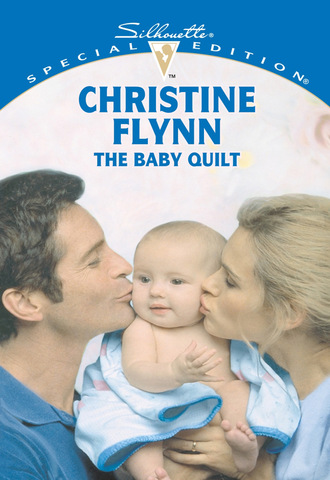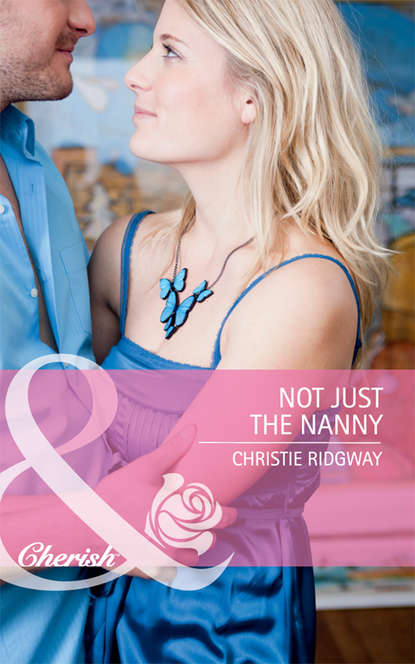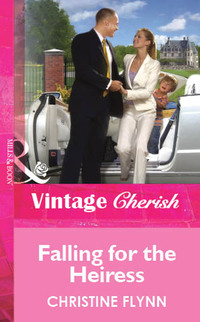
Полная версия
The Baby Quilt
He cleared his throat, training his focus on the wide planks above them while dust swirled and the apocalypse raged overhead. Wondering if those boards would stay put seemed wiser than wondering if that scent was in the silken hair braided and draped over his arm or if it was clinging to her skin.
He glanced back down. “And you’re…?”
“Emily Miller. My daughter is Anna,” she added, then jumped again at the crash of ripping timber.
A huge tree limb arrowed through the open doorway above them. The projectile crashed into the crates of potatoes and onions, splintering itself and the shelves and sending vegetables rolling over the packed dirt floor. Another crash reverberated above them, this one echoing with the sound of shattering glass.
With his back to the melee, his head ducked and his neck exposed, Justin held his breath. He was pretty sure the woman in his arms held hers, too. Only the baby moved. He could feel it wriggling in protest to her mother’s tight hold, but he doubted there was any power on earth, including the fury being unleashed overhead, that could make the woman ease her grasp.
“Justin Sloan?” The sound of his name was faint, muffled by their positions and the cacophony overhead. “May I ask you something?”
He thought for sure she wanted reassurance. It sounded like the end of the world up there. At the very least, it was the end of her house. But if she wanted to know if he thought they’d be all right, her guess would be as good as his.
“Sure,” he said, thinking he’d do the decent thing and lie if it would make her feel better.
“Who are Dorothy and Toto?”
“What?”
“Who are Dorothy and Toto?” she repeated. “And what did you mean when you said you had no intention of playing them?”
He had to sound as puzzled as she did. “You know. From The Wizard of Oz. The movie?” he prompted, thinking she must be trying to distract herself. “The tornado hits Kansas and the girl and her dog get sucked up?”
“Did they survive?”
He would have thought she was joking, except her concern when she looked up at him was too real, the fear in her eyes too tangible.
“Yeah. They did.”
“That’s good. I don’t know of this Oz,” she admitted, the fullness of her bottom lip drawing his glance as she spoke. Her mouth looked soft, inviting. Provocative. With her clear blue eyes locked on his, it also looked enormously tempting. “I’ve heard of Kansas, though. I’ve read that it’s very flat.”
The woman wasn’t making a lick of sense to him, but she was definitely taunting his nervous system. The fact that she was reminding him of just how long he’d gone without the comfort of a woman’s body wasn’t something he cared to consider at the moment. Given their proximity, it seemed best to concentrate on something—anything—else.
Ruthlessly reining in his libido, he focused on the sound of her voice, her accent. She didn’t have much of one, just enough to broaden the sound of her vowels. It was more the pattern of her speech that told him she wasn’t a native—which could easily explain why she hadn’t heard of the movie nearly every kid in America had seen by the time he was six years old.
“I take it you’re not from here.”
“No,” she admitted, putting his very logical mind at ease. “I’m from Ohio.”
Emily had no idea why her response made the big stranger frown. With the swiftness of the lightning arcing above them, the dark slashes of his eyebrows bolted over his pewter-gray eyes. His lean, chiseled features sharpened. The dark expression intensified the sense of command surrounding him, an aura she imagined to be possessed by men like kings and warriors in the library books she devoured. Or like the powerful men who stole women’s hearts on Mrs. Clancy’s soap operas. But she really didn’t care that she confused him. All she cared about was that Anna was safe—and that his deep voice held the power to distract her from thoughts of what would have happened had he not come along.
Shaking deep inside, she glanced from the little red polo player embroidered above the pocket of his navy-blue shirt to her baby, soothing Anna’s fussing by rubbing her back. If not for this Justin Sloan, she never would have been able to get inside the cellar with the wind blowing so hard. While she’d struggled with the door, the wind would surely have blown her little girl away, sucked Anna up as he said the wind had done with Dorothy and her dog. It might have blown her away, too, or caused her to be injured so she couldn’t help her child.
The thoughts drew a shudder to the surface. They were too close to the nightmares she battled every day. Only this time her fears had nearly become reality.
But nothing had happened, she reminded herself. They were safe. For now. Safe and protected by this man who had come out of nowhere and was using his own, very solid body to shield them both.
He must have felt her trembling. His big broad hand slipped along her shoulder, drawing her closer. She sought that contact willingly, too overwhelmed by what she felt at that moment to do anything else. She knew there would be damage to face. She knew that very soon she would have to start rebuilding with whatever nature had left her. But for now, for these precious seconds, she wasn’t having to cope all alone.
The need to absorb that feeling was so acute that it bordered on physical pain. She didn’t know if it was right or wrong to want something so badly. She just knew that she was desperate for what she felt just then. He made her feel secure—and security was something she hadn’t felt in a very long time. The desire to stay in the safe haven of his arms was the strongest yearning she’d experienced since long before her husband had died.
The thought of leaving that shelter was unbearable. But she wasn’t given a choice. She was keenly aware of how solid his body felt, how strong. She was also aware of the tension tightening his muscles and a tingling warmth where her breast and hip crushed his side.
In the pale light, she looked up to find his glance fixed on her mouth.
Her heart gave an odd little lurch an instant before he jerked his attention to the baby nuzzling the fabric covering her breast. The tension she’d felt in his body seemed to settle in hers when he looked up and met her eyes.
Suddenly looking as if he could use more space, he eased back far enough to break contact without leaving her vulnerable and nodded toward Anna.
“Is she okay?”
The question had Emily easing her hold as she tucked her head to see her daughter’s sweet little face. In the pale-gray light, she saw Anna give a great, toothless yawn and scrunch her nose to show her displeasure with the position. She much preferred her head on her mom’s shoulder to having it tucked under her chin.
“She’s fine,” Emily assured him, compromising by shifting her little girl up a bit.
“You’re lucky she is.”
“I know,” she whispered. “If it hadn’t been for you—”
“I’m not talking about me. I’m talking about what you were doing.”
At a loss, she blinked at the hard line of his jaw. “What do you mean?”
“I mean, you obviously knew this was coming, but you were out there trying to save plants instead of getting her inside where it was safe.” His intent gray eyes glittered like quicksilver as they swept her face, reproach melding with disbelief. “Why’d you have her out there, anyway? What would you have done if you’d been hurt yourself?”
His low voice rumbled through her, stiffening her shoulders at his demands, pulling up her chin at the accusation behind them. Not a single day went by that she wasn’t conscious of the fact that she alone was responsible for the welfare of her precious daughter. Everything she did, the backbreaking hours of digging in the fields while Anna slept protected in the shade or cuddled against her in a tummy sling, the planting, the weeding, the canning, the housecleaning for the Clancys—all of it was done with her child in mind.
Moments ago, he’d made her feel protected. Now, he’d jerked away the shield of numbness that had kept her from looking too closely at the enormity of her situation—and left her feeling even more exposed.
“I had her out there because I always keep her with me. She’s safer than she would be alone in the house. And those plants are my livelihood,” she informed him, totally unfamiliar with the sense of challenge he evoked. “I already lost one planting this year to frost. I was trying to save this one because I can’t afford to lose another.”
She swallowed hard. She’d probably lost the planting, anyway. Profoundly aware of the sudden quiet, torn between gratitude for what he’d done and resentment at his implications, she figured she’d best get started saving what she could.
She glanced up, avoiding Justin’s suddenly guarded expression. “The wind has died.”
He didn’t acknowledge her deliberately diverting observation. He didn’t push to know what she’d have done had she been hurt, either. He simply watched the resignation wash through her pale features as she shifted the infant to her shoulder and smoothed the little white T-shirt over her back.
Turning to the foliage and smashed boxes, he jammed his hands on his hips and heaved a sigh. He was out of his element here. He knew nothing of relying on the land for a living. He knew even less about kids—except it seemed to him that something so tiny should be inside in a crib-thing in a nursery or something. What he had known, though, was that he’d been far too conscious of the surprising fullness of her breast, the gentle curve of her hip. Since he’d already been wondering what she’d been using for brains, he’d figured it wiser to focus on that.
He just hadn’t intended to sound so abrupt about it.
Feeling his conscience kicked hard, he frowned at the large limb blocking the steeply pitched stairs.
She slipped from behind him. “At least the steps aren’t broken.”
“Spoken like a true optimist.”
“I’m trying to be,” she murmured, glancing uneasily toward the light filtering through the leaves.
She had no idea what she’d find out there. Seeing her uncertainty, not caring for the twinge of empathy he felt, he shoved aside the limb blocking the first few stairs and held it aside with his back. Pushing through the splintered limbs and leaves wouldn’t be a problem at all. They’d just have to edge up the side. “I’ll go up first and help you out.”
“It might be easier if I go first. You can reach farther than I can. Here,” she said, stepping close to hold out her baby. “When I get to the top, you can hand her up to me.”
Justin froze. Despite the twinge of pain in his shoulder, his hands shot out in pure reflex. He would have done the same thing if someone had thrown him a ball. Only he would have known what to do with a ball. He hadn’t a clue what to do with the little bundle of big blue eyes blinking up at him.
The impossibly light little body was barely longer than his forearm. The tiny fist waving around before finding its way to that wet little rosebud mouth was smaller than the top half of his thumb. He’d never seen fingers so small.
With her hands tucked beneath his, her mom suddenly looked as if she weren’t sure she should let go. “Do you have her?”
His nod was more tentative than he’d have liked. With one palm cupping the back of the baby’s head, he gripped what little there was of a backside with the other. “Yeah. Go on.”
Just don’t fall, he thought as Emily slowly withdrew her support and retrieved the carrier that had rolled under the stairs. The last thing he wanted was to have to figure out what to do with her child if the woman should need help. He’d gone toe-to-toe with three-hundred-pound linebackers playing college football. He’d bested the toughest negotiators in world-class business deals, but he freely admitted that this infant had him feeling completely helpless. Accustomed to being capable, he didn’t like the sensation at all.
“Okay,” he heard Emily call when the rustle of leaves quieted. “I’ll take her now.”
He hadn’t moved. He hadn’t taken his eyes off the perfect little face, either. Glancing up, he saw Emily framed against the lightening sky. She’d set the carrier on the ground above her and crouched two steps from the top, her arms stretched toward him.
Watching the baby as if he were afraid it might do something to upset his balance, he edged up the bottom steps and carefully lifted the blissfully oblivious bundle past the leaves quivering along the wind-splintered barrier. The sharp scent of fresh pitch swirled in the slight breeze, reminding him to watch for the jagged spikes of wood where the branch had snapped in the middle so they wouldn’t catch the tail of the blanket.
He actually felt sweat bead near his temples when the baby jerked her arm and popped herself in the eye. Her face screwed up at the self-inflicted assault, but she didn’t make a sound. He did, though. When Emily’s fingers slipped beneath his and he felt the baby’s weight shift to her hands, his sigh of relief was definitely audible.
Chapter Two
Justin’s first thought when he stepped onto the wet lawn was that the rain had apparently stopped as abruptly as it started.
His second thought was of his car.
With a sinking sensation, he moved beyond where Emily stood clutching her baby and glanced toward the road. Beneath the heavy clouds, he could barely see the tops of the trees near the little bridge and the curve of the road leading down to it. But the trees were still there, as thick and tall as when he’d parked his car beneath them. Closer in, under a sky that was opening with streaks of brilliant blue, the verdant land remained untouched.
The frustration he’d prepared himself to feel over hassles with transportation and insurance adjusters never materialized. His biggest problem—at the moment, anyway—was still his dead battery. Emily Miller, he was sure, hadn’t fared as well.
When he looked from the coop where the chickens were pecking the ground, he found her staring at the walnut tree. What was left of it, anyway. All that remained was a short, jagged spike that had been blasted clean of its bark. The bulk of the sizable trunk was nowhere to be seen—though Justin figured it a safe bet that the branch poking out of the cellar had once been attached to it. So had the even larger branch that had been stuffed through the back porch. That massive limb had taken out the porch’s center support, but the house itself was still standing. By some miracle, so was the greenhouse. Even the windmill, its blades now turning with laconic ease, appeared unscathed.
He’d expected to see nothing but rubble.
“Are you all right?” he asked, since she’d yet to move. He pulled a white sheet from where it had tangled around an upright water pipe. Tossing it over the T of the clothesline pole, he cautiously scanned her profile. “It’s too bad about your tree. And your porch,” he added, since that was actually the bigger problem. “But it doesn’t look like you lost anything else.”
“No. No,” Emily repeated, responding to the encouraging note in his deep voice. “I don’t think I did.” Her own voice lost the strength she’d just forced into it. “It could have been much worse.”
Brushing her lips over the top of Anna’s soft, sweet-smelling head, she stared at the mass of leaves and branches obliterating her back door. She’d immediately noticed that the greenhouse and chickens and the fields had survived, but she hadn’t let herself breathe until she’d turned to her house.
It really could have been worse. And losing a tree and a cellar door and having to patch her porch was nothing compared to what could have been. There was always some good and some bad. The sweet balanced the sour, her mother and her aunts had always said. That was life. It didn’t matter that her own life had swung wildly out of balance. She was to take with relief and thanks all that had been spared. And take in stride and with grace that which hadn’t.
That was how she’d been raised. It was all she knew to do, though she was the first to admit that she’d never mastered the easy acceptance part. As she stood hugging her child, the thought of the extra work it would take to cut up the tree was enough to bring her to tears. There weren’t enough hours in the day as it was. But she didn’t dare let herself cry. She was afraid that if she did, she’d never stop. And she had to be strong for Anna.
At the moment, she also needed to check on her neighbors.
The rows of corn nearest her little plot of land swayed in the diminishing breeze. Where the land gently rose a couple of acres away, she saw nothing but churned-up earth and a chunk of red-and-white siding that looked suspiciously like part of a barn.
“I need to see if the Clancys are all right,” she said, uncomfortably aware of her rescuer’s eyes on her. “Mrs. Clancy just had a hip replaced and their son and his family are away for a few days. There’s no one there to know if they need help.”
Justin stood with his hands on his lean hips, his broad shoulders looking as wide as the horizon. He stared right at her, his wide brow furrowed. He was very direct with his stares, she’d noticed. Not at all subtle the way the few men she knew were when they looked at her. But then, he seemed very direct about his needs and opinions, too. “You wanted to use their phone. Come with me and I’ll show you the way.”
“Thanks, but I think I’ll head on in to town. From the looks of things over there,” he said, nodding toward the cornfields, “the lines are probably down.”
She lifted one shoulder in a shrug, the motion not nearly as casual as she wanted it to be. “I understand tornados are strange. The way they pick and choose what they destroy, I mean. I’ve heard of walls being ripped off, but nothing in the room being disturbed. I think that’s part of Mr. Clancy’s barn,” she said, pointing ahead of her, “but their phone could still be working.”
She was telling him he might be able to save himself some time by coming with her. Whether she knew it or not, she was also making it as clear as the raindrops clinging to the grass that he disturbed her. Her wary glance would barely meet his before shying away, as if she were embarrassed at having been up close and personal with a perfect stranger. He was pretty certain, too, from the strain that had settled into her delicate features that she was more upset than she was letting on about the damage. Yet, even as unsettled as she had to be, she sounded unbelievably calm.
As he watched her kneel to tug a piece of denim from beneath the baby carrier’s thickly padded mauve liner, he couldn’t believe her attitude, either.
He didn’t know a single soul who would walk away from their own crisis to help out someone else with theirs. The fact that she remembered he still had a problem caught him a little off guard, too. After the way he’d jumped on her about leaving her kid outside, he wouldn’t have been surprised if she’d left him to fend for himself.
She carefully tucked the baby’s little legs through two holes in what looked like a denim tube and slipped her own arms through its two long straps. As she did, his glance strayed down the thick braid lying against her back to the fabric covering the sweet curve of her slender hips.
“Even if the phone’s out,” he said, wondering how all that hair would look unbound and spilling over her body, “maybe he can give me a jump.”
Annoyed with the direction of his thoughts, he pointedly pulled his attention from her. “It looks like you’ve been through this before. The greenhouse,” he said, eyeing the skeletal structure to keep his glance from wandering over her again. “You only have a few windows back there. Did another storm take out the others?”
A long strand of loosened hair swayed over her shoulder. Snagging it back, she rose and tucked a soft-looking square of white fabric under the chin of the sleepy-eyed child in her tummy-carrier. “Those are the only windows that were put in. My husband built the greenhouse for me last year, but winter came before he could finish.
“I hired a man,” she continued, absently rubbing the baby’s back through the denim as she motioned for him to accompany her across the lawn. “He put in the windows Daniel framed and I gave him money to buy the rest, but he hasn’t come back yet. I’m sure I don’t have enough plastic to replace what was torn,” she added, more to herself than to him. “I hope he returns soon.”
“How long has he been gone?”
“Two weeks and two days. He wanted to find the best price, so he said it might take him a while.”
They angled toward a dirt road lined with rows of corn. The wind had calmed to a warm breeze that rattled the leaves on the stalks and fanned the ankle-high grass growing on either side of the ruts. “Is this someone you know?” he asked, leaving her to walk on the near side of the road while he headed for the grass on the other side to avoid the mud in the middle.
“I didn’t before he came looking for work. He said he’d worked for a lot of people in the county, though.” A pensive frown touched her brow. “I wonder if he would repair my porch when he returns.”
He should let it go, he told himself. He should concentrate on how quiet it was compared to the cacophony of only minutes ago. It was so peaceful here. Almost…serene. There was no traffic. No horns, sirens, squealing brakes. He should just think about the stillness. He should not question her about something that undoubtedly had as reasonable an explanation as she’d provided for why she’d had her kid out in a tornado.
“He’d said he’d worked for people around here?” he asked, too curious to know what that explanation was to let the matter drop. “You didn’t check out his references yourself?”
“Even if I’d heard of the names he mentioned, I had no way to speak with them. Besides, there was no need. If he couldn’t do the work, it would be obvious, wouldn’t it?”
There was a certain literal quality to her logic, a simplicity Justin would have found quite eloquent had she not entirely missed his point. He’d bet his corner office that the guy was an itinerant.
“I don’t suppose this man is from around here, is he?”
“He didn’t say.”
Fighting incredulity, he cast her a sideways glance.
“Do you know his name?” he asked, all but biting his tongue to keep his tone even.
The look she gave him was amazingly patient. “Of course I do. It’s Johnny Smith.”
John Smith. How original.
“So you gave this man you really don’t know money to buy something for you and you haven’t seen or heard from him in two weeks.”
“He said he wanted to shop for the best price for me,” she reminded him, looking at him a little uncertainly. “And he did put the other windows in. He did a good job, too.”
“Do you mind if I ask how much you paid him?”
“Twenty dollars.”
“What did you give him for the windows?”
“I only had a hundred.”
There was such innocence in her lovely eyes. And caution. And concern. The myriad impressions registered with Justin moments before she glanced away to watch where she was stepping.
Johnny Smith had done a good job, all right, he thought. A snow job. “You might want to report Johnny to the authorities, Mrs. Miller. He stole your money.”
“I don’t believe that,” Emily said, incredulous. “Not for a moment.” She blinked hard at the distance, her hand still protectively on the little bump resting against her stomach. “He was far too nice to want to do any harm.”
The air of innocence he’d noticed about her before now struck him simply as naiveté. She obviously wanted to believe the best about the man. About people in general, he suspected, though he found the aspiration more dangerous than admirable.
“There are a lot of ‘nice’ crooks out there,” he countered, wondering if the woman had ever set foot off the farm. “I take it you’ve never been conned before?”
“Conned?”
“Swindled, cheated, deceived? No one’s ever taken advantage of you or your husband?”
Her glance darted from his, something like guilt shadowing the delicate lines of her face. “He took nothing that I didn’t give him from my own hand.”












